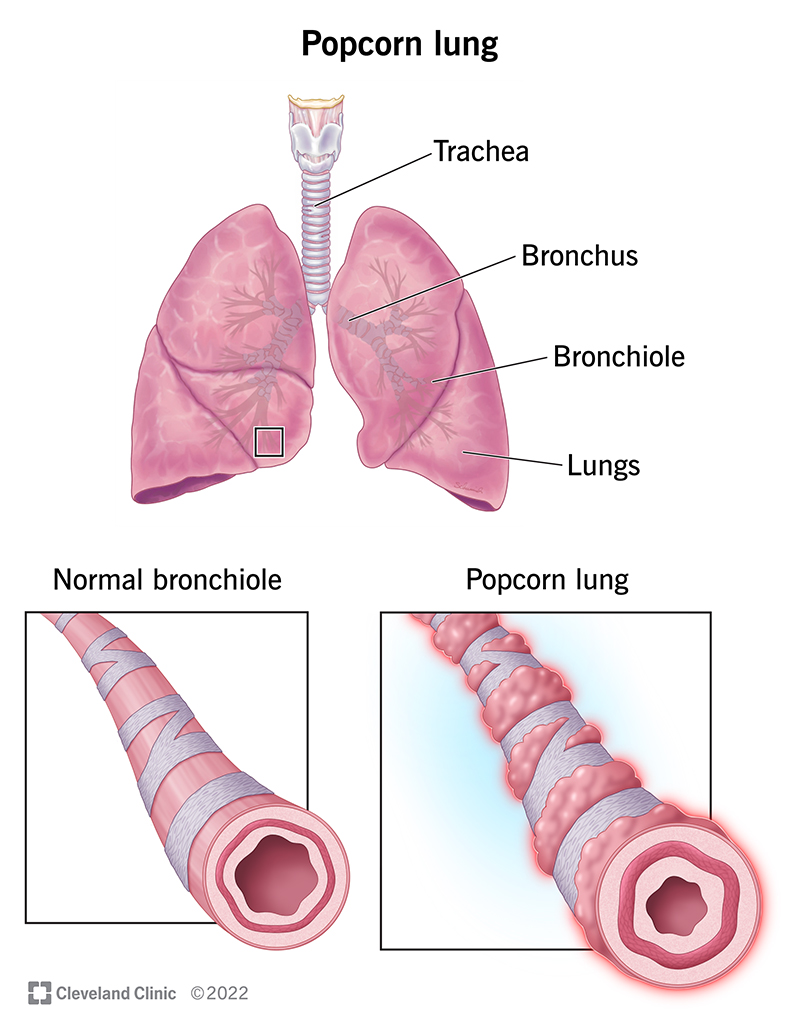Popcorn lung (bronchiolitis obliterans) is a condition that affects your bronchioles. Toxic substances, vaping and infections damage these small airways, which causes breathing problems like coughing, wheezing and shortness of breath. Treatment can help slow the damage. But it can’t cure the condition.
Advertisement
Cleveland Clinic is a non-profit academic medical center. Advertising on our site helps support our mission. We do not endorse non-Cleveland Clinic products or services. Policy

Image content: This image is available to view online.
View image online (https://my.clevelandclinic.org/-/scassets/images/org/health/articles/22590-popcorn-lung)
Popcorn lung is a respiratory (lung) condition that affects your bronchioles. Your bronchioles are the smallest airways in your lungs. Popcorn lung can lead to:
Advertisement
Cleveland Clinic is a non-profit academic medical center. Advertising on our site helps support our mission. We do not endorse non-Cleveland Clinic products or services. Policy
Popcorn lung is rare. An infection or breathing in toxic substances can result in it or cause it. It can occur in people with connective tissue disease, like rheumatoid arthritis. It may also affect people after they receive a lung transplant. About 1 in 2 people who have lung transplants will develop popcorn lung within five years of their procedures. About 1 in 10 people who receive donor bone marrow also develop popcorn lung within five years.
Other names for popcorn lung are:
The name probably comes from when researchers first identified the condition among workers in a microwave popcorn factory. The workers breathed in diacetyl. Diacetyl is a chemical that makes popcorn taste buttery. Many popcorn manufacturers no longer use diacetyl in their popcorn.
Other industries also used diacetyl to flavor products. Healthcare providers have also diagnosed popcorn lung in people who worked at a coffee roasting plant. Diacetyl naturally releases during the process of roasting coffee beans. The liquid in e-cigarettes (vapes) also contains diacetyl.
Advertisement
You may not have symptoms of popcorn lung at first. But some common signs of popcorn lung include:
A popcorn lung cough usually sounds dry. But sometimes, it may bring up mucus.
Popcorn lung causes include breathing in toxic substances and some types of infections. You may come across these substances through work or by vaping. E-cigarettes have many chemicals that may be dangerous to your lung tissue. Experts think secondhand e-cigarette vapor can affect those around you, too.
Receiving a lung transplant is also a popcorn lung risk factor.
Certain people have a higher risk of getting bronchiolitis obliterans because they breathe in toxic substances in the air. These substances are present in some types of manufacturing. They’re also in e-cigarettes. Breathing in the following substances can increase your risk of developing popcorn lung:
The following conditions also increase your risk of developing popcorn lung:
A healthcare provider will review your medical history, ask about your symptoms and do a physical exam. Many popcorn lung symptoms are common in other conditions. But if your provider suspects you have popcorn lung, they may recommend tests to confirm their diagnosis. These tests may include:
There’s no cure for popcorn lung. The damage won’t go away. But treatment is available to help slow the damage and relieve your symptoms.
You should first avoid exposure to any substances that cause popcorn lung. If you work around these substances, it’s important to use the recommended personal protective equipment (PPE), like an N95 mask. If you smoke or vape, you should quit.
Depending on how serious your popcorn lung condition is, a healthcare provider may recommend:
In severe cases, you may need a lung transplant.
It’s important to get a popcorn lung diagnosis and treatment as soon as possible. Treatment is more likely to be effective if a provider catches it early.
Contact a healthcare provider if you have trouble breathing that doesn’t get better after using a rescue inhaler. Call if your symptoms get worse or you develop new symptoms.
Advertisement
At your appointment, you may wish to ask:
It depends on how severe your condition is. There’s no cure for bronchiolitis obliterans. You need lifelong care to manage your symptoms. And popcorn lung may not always respond well to treatment. Healthcare providers will give you a better idea of what to expect after testing.
It’s important to protect your lungs as best you can:
Bronchiolitis obliterans syndrome (BOS) is another name for popcorn lung. Healthcare providers may use the term BOS when popcorn lung symptoms occur after a lung transplant or stem cell transplant.
Some damage to your lungs can heal or improve with medications if you quit vaping. But lung scarring is permanent.
Advertisement
It’s easy to write off breathing problems as symptoms of a common lung infection. But if you work around toxic substances and have long-lasting symptoms, it’s a good idea to schedule an appointment with a healthcare provider.
Popcorn lung is a serious condition. And there’s no cure for it. If you have symptoms, see a provider as soon as possible. They can help manage your symptoms and potentially slow the damage.
Advertisement

Sign up for our Health Essentials emails for expert guidance on nutrition, fitness, sleep, skin care and more.
Learn more about the Health Library and our editorial process.
Cleveland Clinic’s health articles are based on evidence-backed information and review by medical professionals to ensure accuracy, reliability and up-to-date clinical standards.
Cleveland Clinic’s health articles are based on evidence-backed information and review by medical professionals to ensure accuracy, reliability and up-to-date clinical standards.
Breathing issues can affect your life in many ways. Cleveland Clinic’s respiratory therapy program treats your symptoms so you can feel better day to day.
